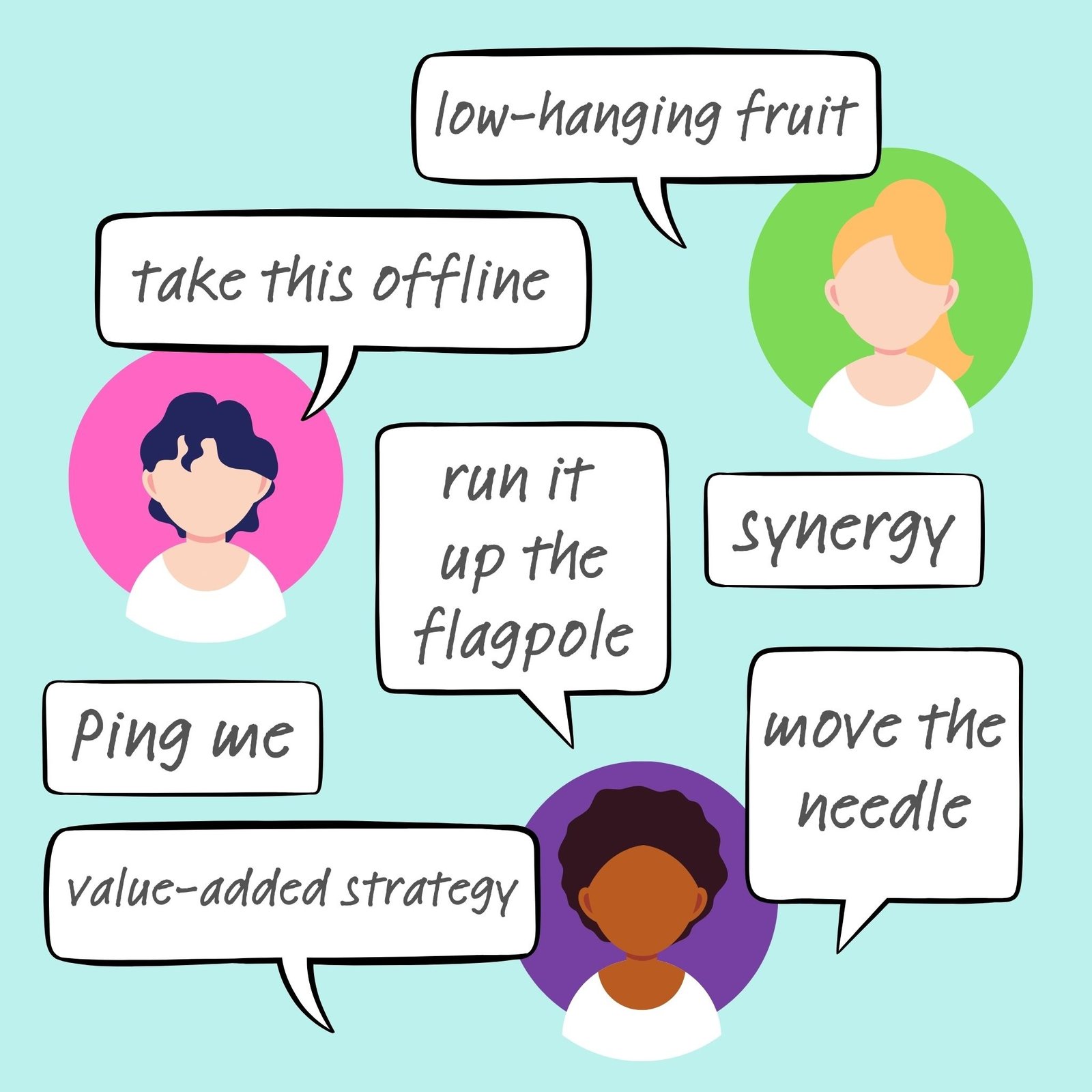Corporate Lingo
How to get by without a translator
- May 6, 2025

If you are in a medium to large company, you are likely surrounded by it every day. You pick up on that curious way of conversation that’s largely comprised of corporate lingo – those made-up phrases that are seemingly there to make people sound smarter.
So, instead of this exchange:
“I’ll talk to you later so we can get into more detail. We don’t have to cover everything – I just want to get into more about what the boss was talking about, so we can finish the project. It might take a while.”
You hear:
“Let’s circle back so we can do a deep dive. We don’t need to boil the ocean; I just want to piggyback on what the boss said so we can close the loop. It’s a journey.”
There’s an office shorthand – whether it’s on a videocall, in person on email. There’s no escaping it. You’re likely to encounter phrases like “let’s table that,” “double-click,” or “dovetail on his point” nearly every day. And, you have to be on the lookout for new phrases and be ready to decipher their meanings based on context. Whether you thrive in a lingo-filled environment or dread hearing the newest catchphrase, corporate-speak is everywhere, and it’s likely here to stay.
We’ll break down corporate lingo – what it is, how to decode it, when to use it (or not) in your own voice. And we’ll see what happens if you find yourself veering out of your swim lane and using work phrases when you’re in a social situation.
Why Do People Love Their Corporate Lingo?
Corporate speak isn’t just about sounding buzzy. For years, humankind has built cultures and a sense of community around a common language. Corporate lingo is no different – it’s a way to build bonds, create shortcuts and align coworkers to move quickly in the same direction. If it works well, it can create efficiencies and decrease miscommunications. If it doesn’t work well, it can be vague, confusing and sometimes pretentious.
Pros of having a robust corporate lingo vocabulary:
- Better understanding of what is being communicated
- Ability to stay current with the latest terms and phrases
- Knowing when to use it and when to speak more plainly
- Being able to build on the ideas and reasoning of your teammates
Cons of relying too much on your corporate lingo vocabulary:
- Potential misuse of a phrase or term
- Overuse of corporate terms and losing your own voice
- Tendency to make up or try out new terms that others may not be familiar with (which may cause miscommunication)
A Few of the Most Common Corporate Phrases (and What They Actually Mean)
There are so many common words and phrases, with new ones being introduced all the time. Here are some of the most common, what they mean and what to watch out for:
“It’s a journey”
Translation: “The task might take a while,” or “There’s a whole long process involved”
Beware: High potential for overexaggeration –not every journey is long – don’t make it seem more onerous than it is
“To piggyback on what she said…”
Translation: “I agree with her, and I want to add on”
Beware: Make sure you really have something new to add; people tend to tune out piggy backers who are only repeating the last point
“Let’s double-click on that”
Translation: “There’s more detail underneath my main point”
Beware: While it’s often used with its close cousin the “deep dive”, it is important to actually have additional detail to discuss
“No need to boil the ocean”
Translation: “Let’s not overcomplicate this or take on too much”
Beware: It may be seen as overly dramatic or exaggerated, or it could get people thinking less about what you’re saying and more about their next cruise vacation
“In your swim lane”
Translation: “Your role, your function, your expertise”
Beware: Has the potential to become aggressive in tone (e.g. “stay in your lane!”); but could be useful for defining and focusing roles and responsibilities
How to Adapt to a Lingo-Heavy Environment
There are a few important steps to surviving in a workplace that makes ample use of corporate lingo. Following these steps can help you learn the lingo without having it overwhelm you.
- Listen actively
Your meetings, 1:1, company emails and teleconferences can be like a language immersion class. You’ll certainly hear a new phrase or term that you don’t know – make a note of it. If you don’t know what it means, do a quick search for the term. It’s likely not the first time it was used. - Ask (when appropriate)
If you don’t have any luck online, turn to a trusted coworker. It’s ok to admit that you missed the full context behind a new term or phrase. You might even find that they have questions too. - Understand the context
When you see or hear a new phrase, make note of the context. Sometimes corporate lingo only makes sense in specific situations. In an internal meeting, a “deep dive” might be a set of analyses to help make a decision. In a customer meeting, a “deep dive” could be listening to understand a customer problem. - Keep track of what you learn
A running list or a note on your phone can be helpful if you have trouble remembering new lingo. It can also come in handy when someone new asks you for help interpreting.
Should You Use Corporate Lingo?
With an introduction to some of the key terms and their pitfalls and a method to learn new phrases, you have to decide how much corporate lingo to use yourself.
It’s helpful to rely on some rules of thumb, or do’s and don’t’s:
USE IT
- if it adds clarity
- if it helps to assimilate into the team dynamic
- if it’s a useful shorthand or it’s efficient
DONT USE IT
- if you’re trying to sound cool
- if you might sound cliché
- if you’re not totally sure of its meaning or fit
When in doubt, it’s always better to start slow. There may be a few phrases that are common, and you feel comfortable using them. Try sprinkling them into a few conversations and gauge the reactions. You’ll still want to use your own voice and speak mostly with plain language.
A Cautionary Tale: When Work Speak Follows You Home
You may find yourself becoming so comfortable with the work jargon that it starts to bleed over into your personal life. There’s a chance you could be out to brunch with friends on a weekend and you start “echoing that thought” or “closing the loop.” Your friends might look at you strangely, and hopefully they will snap you out of your corporate stupor.
If this happens to you, it’s easy to recover. First, laugh it off. It’s natural that the time you spend at work could bleed over into your social time. Just smile and get yourself back to personal mode. Then, embrace the situation as a way to practice switching your mindset. Adjust from how you speak to your colleagues at work to how you speak with your friends when you’re having fun. If the situation is right, it might even be a way to connect with your friends and share about the challenges or situations you’re facing at work.
Call to Action – Hone Your Communication Skills
It’s easy to understand why corporate lingo remains part of the workplace environment and culture. It’s a not-so-secret code that helps teams move faster together. However, it’s not a requirement for success. You don’t have to fully integrate corporate language into every meeting, email or phone call.
Your communication skills will improve as you understand corporate lingo, listen for changes and new developments, interpret the terms and phrases, and use it appropriately to fit your style.
So, you don’t have to “synergize the cross-functional collaboration” to become a strong team member or leader. Sometimes, it is just as effective to “keep things simple” or “take a close look” or “call someone later.” Using plain language in a way that suits you never goes out of style.
More Posts You May Like
- All Projects
- Blog
- Category 1
- Category 2
- Category 3
- Category 4
- category 5
- Category 6















